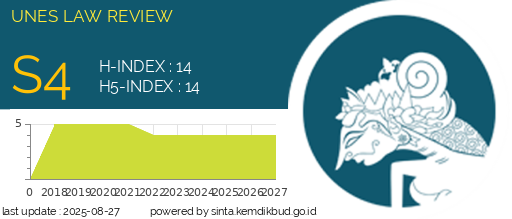Tinjauan Sosiologis Terhadap Pembagian Hak Waris Tanah Menurut Hukum Waris Adat Toraja Pa’ Rinding di Lembang Batualu Kecamatan Sangalla’ Selatan
DOI:
https://doi.org/10.31933/unesrev.v6i1.988Keywords:
Division, Inheritance, Land, Pa' RindingAbstract
In the customary inheritance division in Lembang Batualu, South Sangalla' Subdistrict, it is known as Pa' Rinding, which is the distribution of inheritance based on the number of buffalo or pig sacrifices made by the heirs when the deceased passes away. In the Pa' Rinding inheritance division, the rights of other heirs can be forfeited, meaning that inheritance rights are transferred only to specific individuals. Despite the modern times, such rules are still applied and firmly upheld by some Toraja communities. Additionally, the rules and procedures in the Ma' Rinding process are not clearly defined within the inheritance laws of the Indonesian Civil Code (KUH Perdata). The research method employed in this study is empirical juridical, which examines the applicable legal provisions and their practical application in society. The research findings confirm that the procedure for the transfer of inheritance rights in Pa' Rinding is within the inheritance legal system used in Lembang Batualu, South Sangalla'. The transfer of inheritance rights occurs after the death of an individual who possessed assets and heirs. Furthermore, Pa' Rinding is intertwined with the rambu solo’ ceremony (funeral ceremony), where there are provisions for the heirs to make sacrifices of buffalo or pigs during the rambu solo' ceremony. These sacrifices serve as the basis for the subsequent heirs to manage the deceased's estate. The limitations on the assets that can be distributed to the heirs in the Pa' Rinding process in Lembang Batualu, South Sangalla', are based on the nature of the assets. Only the assets that were the livelihood of the deceased can be distributed through Pa' Rinding, while ancestral property or tongkonan land, which is communal property, cannot be divided further.
Downloads
References
Kitab Undang-Undang Hukum Perdata
Lumentut, L., Rosmawati. “Hak Anak Dalam Sistem Kewarisan Adat Masyarakat Sangla’boran Kabupaten Toraja Utara”. Paulus Law Journal 1, no.1 (2019): 19-9
Rombeallo, Y. M., Saka, B. G. M., Rante, M., “Ma’ Sulang (Penebusan Tanah Gadai Adat) Masyarakat Tana Toraja Dalam Perspektif Hukum Positif Di Indonesia”. Unes Law Review 5 no.4, (2023): 2124
Sari, I. G. A. P. O. C., Wairocana, I. G. N., Suyatna, I. N., “Peralihan Hak Atas Tanah Berdasarkan Hibah Wasiat Oleh Pelaksana Wasiat”, Acta Comitas Jurnal Hukum Kenotariatan 3 no.1, (2018): 163
Tangdilintin, L. T., Toraja dan Kebudayaannya, Jakarta: Balai Pustaka, 2014.
Tanuwidjaja, T.H. “Akibat Hukum Pewarisan Karena Afwezeigheid Terhadap Ahli Waris Menurut Hukum Perdata Barat (BW)”. Jurnal Hukum Bisnis 3, no.1, (2019): 21-22
Tuken, R., Pembagian Harta Warisan Berdasarkan Huku Adat Toraja, Makassar: Agma, 2020.
Waluyo, B., Penelitian Hukum Dalam Praktek, (Jakarta: Sinar Grafika, 2002)
Downloads
Published
How to Cite
Issue
Section
License
Hak cipta :
Penulis yang mempublikasikan manuskripnya di jurnal ini menyetujui ketentuan berikut:
- Hak cipta pada setiap artikel adalah milik penulis.
- Penulis mengakui bahwa UNES Law Review berhak menjadi yang pertama menerbitkan dengan lisensi Creative Commons Attribution 4.0 International (Attribution 4.0 International CC BY 4.0) .
- Penulis dapat mengirimkan artikel secara terpisah, mengatur distribusi non-eksklusif manuskrip yang telah diterbitkan dalam jurnal ini ke versi lain (misalnya, dikirim ke repositori institusi penulis, publikasi ke dalam buku, dll.), dengan mengakui bahwa manuskrip telah diterbitkan pertama kali di Jurnal UNES Law Review.



















